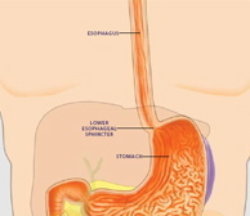
Eosinophilic esophagitis is also known as allergic esophagitis or idiopathic esophagitis. Eosinophils are a certain type of white blood cell typically associated with allergies. This disease is characterized by those eosinophils being deposited in the esophagus. This deposition of eosinophils in the esophagus leads to inflammation and even tissue damage.
What are the Symptoms?
Symptoms of eosinophilic esophagitis vary depending on age.
- Infants tend to demonstrate poor growth, vomiting and feeding refusal.
- Older children may complain of heartburn, difficulty swallowing or even getting food items stuck in the esophagus.
Males and Caucasians tend to be more at risk for this disease for unknown reasons. Children with eosinophilic esophagitis also tend to have other allergic diseases including asthma, allergic rhinitis, and eczema.
How is it Diagnosed?
Eosinophilic esophagitis is diagnosed by upper endoscopy, which is performed by a pediatric gastroenterologist. The physician may be able to see changes in the esophagus that look abnormal at the time of the procedure. Biopsies or small pieces of tissue obtained at the time of the procedure are used to confirm the diagnosis. There is an overlap of eosinophilic esophagitis with gastroesophageal reflux since both diseases may cause the deposition of eosinophils. Therefore, more than one endoscopy noting persistent of eosinophilia while on acid suppression medication or a ph probe study is sometimes needed to confirm the diagnosis.
How is it Treated?
There are a variety of ways to treat eosinophilic esophagitis. The first form of treatment is dietary modification. This may involve an elimination diet directed by a dietician or elemental formula for younger children. Referral to an allergist for skin prick testing or bloodwork may help identify culprit foods to avoid. Unfortunately, often allergy testing is unable to identify causative foods. Another form of treatment is medications such as steroids and acid suppression. In rare cases, esophageal dilation is needed to treat esophageal narrowing.
References: Children's Digestive Health and Nutrition Foundation The American Partnership for Eosinophilic Disorders North American Society for Pediatric Gastroenterology, Hepatology and Nutrition
